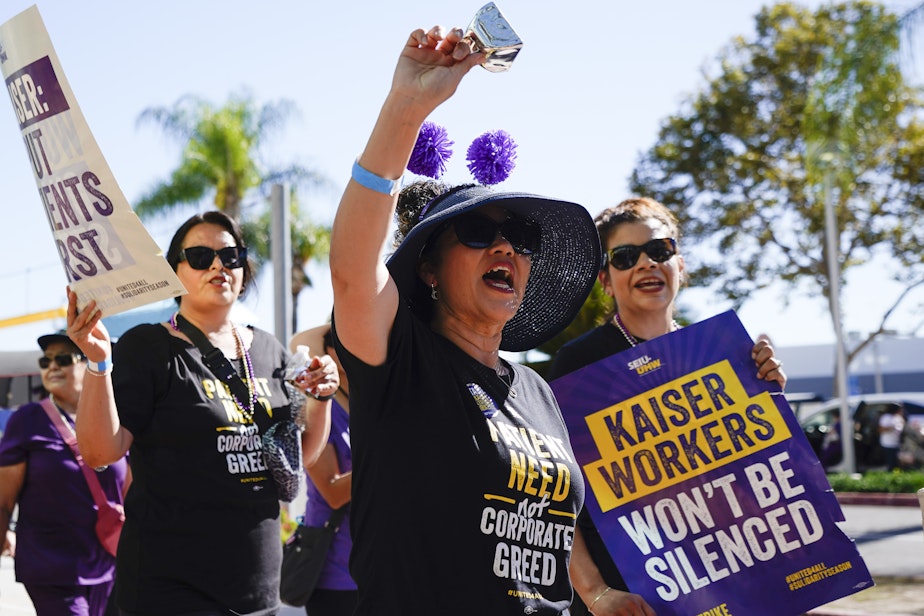Kaiser health care workers in Washington state vote to strike

Thousands of Kaiser Permanente health care workers in Washington will go on strike next month if a new contract is not reached by the end of October.
Contract negotiations between the health care giant and workers in the state have been ongoing since the spring.
Roughly 3,000 workers across 36 sites in Washington voted overwhelmingly this week to authorize a strike, which would run from Nov. 1 until Nov. 8.
“Striking is absolutely the last resort, but an action we're willing to take to protect Washington health care workers and patients,” said Jane Hopkins, a nurse and president of SEIU Healthcare 1199NW, during a media briefing Friday.
“We're calling Kaiser Permanente to reach a deal on time to avoid a strike,” Hopkins said.
Hopkins said 99% of union members voted to strike if a deal is not reached in the next two and a half weeks. A walkout would affect Kaiser sites from Seattle to Spokane.
The announcement comes on the heels of a three-day walkout by tens of thousands of Kaiser workers in other states, and some in southwest Washington.
Sponsored
It also comes as Kaiser has reached a tentative deal with a national coalition of unions representing more than 75,000 workers, many of whom participated in last week’s strike.
The tentative deal sets a new minimum wage for Kaiser Permanente health care workers. For workers in Washington, that wage would be $23 per hour.
While Hopkins said the national agreement is an amazing step forward, she said more is needed in Washington.
Hopkins said Kaiser workers in the state are 20-30% behind colleagues at other local institutions.
“Even with the wages that we got nationally, there is no way that they’ll be able to recruit or retain workers,” she said.
Sponsored
Workers in a range of positions in Washington, including nursing, social work, and environmental services, say short staffing is a major issue at Kaiser sites.
They say current pay levels mean colleagues are often leaving to work at other health care institutions, and clinics are relying on expensive contracts with travel staff who fill vacant positions on a temporary basis, often earning far more than permanent staff.
“In two decades, I have never seen the kind of turnover, the lack of access to care, or the safety issues that we’re facing,” said Alanna Martin, a social worker specializing in mental health care at a Kaiser Permanente urgent care clinic in Seattle.
“I see the impacts of short staffing every day. In my department it’s a safety crisis for both our workers and our patients,” Martin said.
Along with higher wages, workers are also pushing for language around staffing ratios, and a commitment to addressing long-standing racial equity and justice issues.
Sponsored
Christine Muña, an environmental services worker at a Kaiser clinic in Seattle’s Capitol Hill, said she’s grateful for the attention local management has given to these issues so far during negotiations.
She said language has been agreed to that prevents harassment or discrimination of workers speaking their native language in the workplace.
“That’s an important step,” Muña said. “But we know it’s going to take more than a policy to address harassment. We need long-term change in workplace culture and practices. There have been many times where I have witnessed a co-worker being treated unfairly or discriminated against,” she said.
A representative for Kaiser Permanente Washington said in a statement that a notice for a potential strike had been received from SEIU Healthcare 1199NW.
“Kaiser Permanente remains committed to reaching an agreement that is good for our employees, our members, and our organization, and we will continue to bargain in good faith,” the statement said.
Sponsored
The statement did not address specific claims about staffing levels or workplace issues.
Like many other health care institutions, Kaiser Permanente was hit hard financially by the pandemic.
The organization posted net losses of $1.3 billion in the second quarter of 2022.
This year, however, their financial situation has rebounded. Kaiser Permanente reported a net income nationally of $2.1 billion for the same period in 2023.
Kaiser Permanente workers are not alone in their push for better pay and staffing, many health care institutions in Washington have faced similar calls from workers in recent years, with some local workers winning dramatic raises in contract negotiations.




